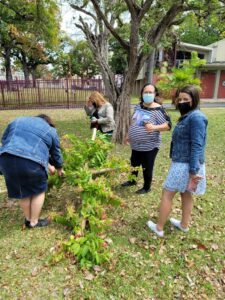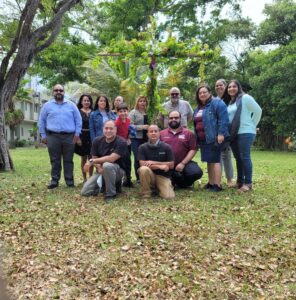We Belong to The Lord
Raul Santiago Rivera works with the Evangelical Seminary of Puerto Rico.
The COVID-19 pandemic transformed our daily routines, changing what everyday life would and should be. Routine life events, the birth of a child, school courses, work, driving freely around the city, dining out, dates, weddings, graduations, family and friend gatherings, worship services, shopping, haircuts, doctor visits, and dropping off the mail will never be the same, thanks to a virus called COVID-19. Moreover, we do not greet or welcome people in the same manner as before 2020. Hugging is an affectionate welcome I may give to a friend that I have not seen in a while. Hugging and kissing on the cheek is part of my heritage. Covid-19 took that away as well.

From all the things that have changed, I have pondered about something my dear teenage daughter Iris brought to my attention several months ago. Late in 2019, she had gotten a hamster as a pet. She called the hamster Sophia. She named her after her favorite character from the 1980’s sitcom “The Golden Girls.” If you remember the sitcom, you may get a pretty good idea of the character and personality of my daughter. She played with, fed, cleaned the cage, and took good care of Sophia. Sofia was her friend, her companion, her sense of routine and normalcy amid the pandemic. Iris had purchased a hamster exercise ball, placed Sophia inside, and let her roll all over the place. Sophia would explore the house, experiencing new smells, learning to tease Max and Rudy, our dog and cat. Iris and Sophia developed a special relationship that allowed Iris to have a more normal routine beyond virtual encounters, facetime calls, and online classes.
Part of my Sunday routine is to get up early in the morning, around 3:30 am. I take this time to review the liturgy for Sunday morning worship, check my sermon notes, and print the final liturgy. One Sunday morning in April 2021, I got up as usual. I usually open some windows and the backyard door. We do not have a central air conditioning unit. Therefore, I open windows and doors to allow the morning cool breeze of the Caribbean to fill the house. I enjoy the ambiance it creates. Cup of coffee in hand, I sat before my laptop and started to work. Several minutes later, I heard a painful sound coming from the laundry room. As I stand to investigate, I found a stray cat inside the laundry room and the source of the cry for help. Sophia has left the safety of her habitat that morning without the protection of her exercise ball. In one of her many experiences exploring the house, she has found new smells, obstacles to overcome, and an excellent place to hide in the laundry room. Sadly, that early morning of April, a stray cat also found his way to the laundry room. Their encounter did not have a happy ending.

During worship, I mentioned the early morning event. I shared how Iris took the dog and went searching for the cat around the neighborhood. No, she did not find him. Some of the people in worship laughed as they saw the story kind of funny. Others looked at Iris and expressed their sorrow. Then I shared something Iris told me on our way to church that morning. She said that she understood that we all belong to the Lord. The Lord creates and sustains our lives. The Lord also takes life away. Her sadness was not because Sophia is not with us any longer. Her sadness and sorrow were because she did not have the opportunity to say “Goodbye.”
The author of the Epistle to the Romans wrote: “Living or dying we follow the Lord. Either way, we are his.” [Romans 14:8 Living Bible (TLB)]. From the moment we are conceived until our last breast of air leaves our lungs, we are the Lord’s. That is our faith and belief. However, we still need to say goodbye.
We all know people who passed away in the last year. Regardless of the circumstances of their death, our ability to gather and celebrate their lives and the hope of resurrection in Jesus Christ was constrained. In Puerto Rico, witnessing funerals was not allowed until June 2021. As part of the joint ministry with the Evangelical Seminary of Puerto Rico and my local church, I officiated over 25 funerals. No more than 5 people were allowed in the chapel, and no burial site ceremonies were conducted. Since June, I have served in 7 worship services celebrating the lives and the hope of resurrection for friends, student’s families, and congregation members that died last year. It is a sad and challenging situation to wait so long to have closure. As a church, we need to be ready and willing to provide comfort and compassion to those still waiting to say goodbye.
The Seminary understands the need for closure and to say goodbye, especially under the pandemic’s circumstances. For over 100 years, the Seminary students have learned compassion, love, and care for the gospel. Thru the courses of Care in Mourning and Loss, Chaplaincy, and Pastoral Counseling, the church’s future leaders prepare themselves with the knowledge, tools, and experiences to accompany and support those in mourning. Moreover, seminarians learn to turn words into the living testimony of Jesus Christ’s love and compassion.
Today more than ever, we are called to be living witnesses of the grace and mercy of the Gospel of Jesus Christ, our Lord, and Savior. Being witnesses by accompanying those that sorrow, with those in the process of reliving their loss; providing closure to those seeking closure. Let’s be agents of love, care, and compassion even when the aftermath of the pandemic reminds us of what we lost, what changed, and what will never be the same. We proclaim that in life and death, we belong to the Lord. Our words proclaim to the word that we are faithful servants for the Lord Almighty. Our actions must become a living testimony of our faith.
Raul Santiago Rivera works with the Evangelical Seminary of Puerto Rico. His appointment is made possible by gifts to the Disciples Mission Fund, Our Church’s Wider Mission, and your special gifts.
Make a gift that supports the work of Raul F. Santiago Rivera
